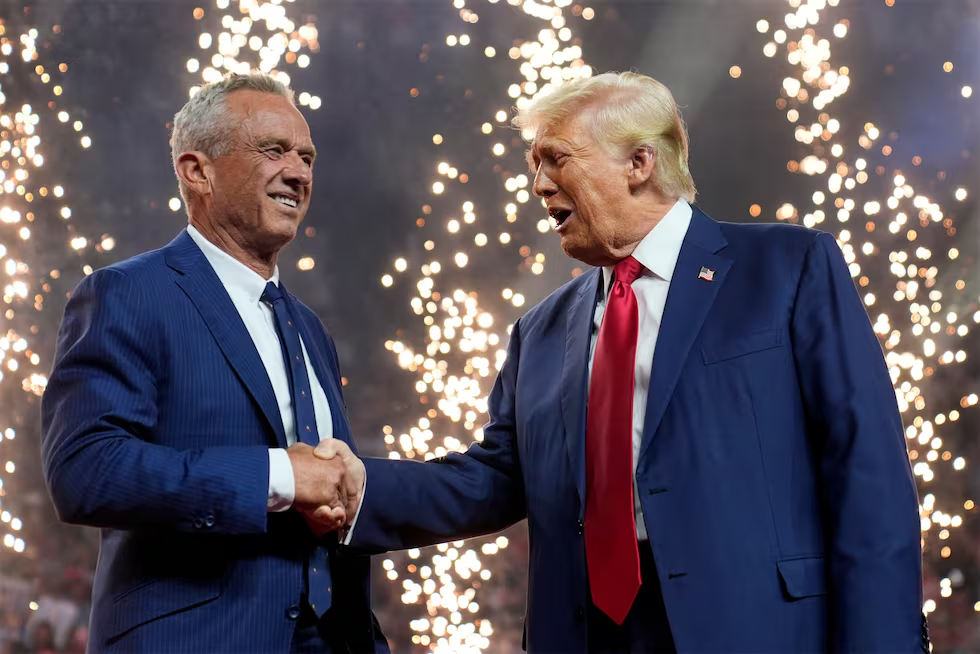Trump and Kennedy: A Clash of Ideologies in Modern American Politics
Trump and Kennedy: A Clash of Ideologies in Modern American Politics
In the ever-evolving landscape of American politics, few names resonate as powerfully as Trump and Kennedy. These two figures, representing vastly different ideologies and approaches, have left indelible marks on the nation’s political discourse. As President-elect Donald Trump prepares to take office, his unconventional methods and controversial choices continue to stir debate. Meanwhile, Robert F. Kennedy Jr., a prominent critic of vaccines and a polarizing figure in public health, has been nominated to lead the Department of Health and Human Services. This article delves into the contrasting philosophies and actions of Trump and Kennedy, highlighting their impact on contemporary politics.
Trump’s Unconventional Approach to Cabinet Appointments
Donald Trump’s presidency has been characterized by a departure from traditional norms, and his approach to Cabinet appointments is no exception. Trump’s transition team has opted to bypass traditional FBI background checks for some of his Cabinet picks, instead relying on private companies for vetting. This decision reflects Trump’s deep mistrust of the national security establishment, which he often refers to as the “Deep State.” Critics argue that this move undermines established protocols designed to ensure national security and prevent conflicts of interest.
One of the most controversial figures in Trump’s Cabinet is Matt Gaetz, nominated for the position of Attorney General. Gaetz has faced numerous investigations related to sex trafficking, although he has repeatedly denied any wrongdoing. Trump’s decision to nominate Gaetz, despite these allegations, underscores his willingness to challenge conventional vetting processes and prioritize loyalty over traditional qualifications.
Kennedy’s Polarizing Views on Public Health
Robert F. Kennedy Jr., a scion of the Kennedy political dynasty, has emerged as a leading critic of vaccines and a proponent of alternative health practices. His nomination as Secretary of Health and Human Services has sparked widespread concern among public health experts. Kennedy’s views on vaccines, fluoride in water, and unproven therapies like hydroxychloroquine for COVID-19 have positioned him as a polarizing figure in the health community.
Kennedy’s deep mistrust of corporate influence on health and medicine has led him to advocate for positions that often clash with mainstream public health recommendations. For instance, he opposes the fluoridation of water, a practice widely endorsed by the Centers for Disease Control and Prevention (CDC) for its role in reducing tooth decay. Kennedy’s stance on vaccines, particularly his promotion of the debunked theory linking vaccines to autism, has drawn sharp criticism from medical professionals who argue that his views endanger public health.
The Intersection of Trump and Kennedy’s Ideologies
Despite their differing backgrounds and areas of focus, Trump and Kennedy share a common thread in their skepticism of established institutions. Trump’s disdain for the national security establishment and Kennedy’s mistrust of the pharmaceutical industry both reflect a broader trend of questioning traditional authority. This skepticism has resonated with segments of the American public who feel disillusioned with the status quo.
However, the implications of their ideologies differ significantly. Trump’s approach to Cabinet appointments and national security raises concerns about the potential for conflicts of interest and the erosion of established norms. In contrast, Kennedy’s views on public health have the potential to undermine decades of progress in disease prevention and health promotion.
The Impact on Public Health and National Security
The nomination of Robert F. Kennedy Jr. as Secretary of Health and Human Services has significant implications for public health policy. If confirmed, Kennedy would have the authority to steer the nearly $48 billion annual budget of the National Institutes of Health (NIH) away from drug development and toward studies on chronic disease. He has also expressed a desire to prosecute medical journals under federal anti-corruption statutes, a move that has alarmed the medical community.
Kennedy’s stance on vaccines is particularly concerning. His promotion of vaccine skepticism has been linked to outbreaks of preventable diseases, such as the measles outbreak in Samoa in 2019. Public health experts warn that Kennedy’s influence could lead to decreased vaccination rates and increased vulnerability to infectious diseases.
On the national security front, Trump’s decision to bypass traditional vetting processes for Cabinet appointments could have far-reaching consequences. The lack of thorough background checks raises the risk of appointing individuals with undisclosed conflicts of interest or foreign ties. This approach also reflects a broader trend of undermining established norms and institutions, which could have lasting effects on the integrity of the federal government.
Conclusion
The contrasting ideologies of Trump and Kennedy highlight the complexities and challenges of modern American politics. Trump’s unconventional approach to Cabinet appointments and Kennedy’s polarizing views on public health both reflect a broader trend of skepticism toward established institutions. As these two figures continue to shape the political landscape, their actions and decisions will undoubtedly have lasting impacts on national security, public health, and the broader fabric of American society.
In the coming years, the interplay between Trump and Kennedy’s ideologies will be a critical factor in determining the direction of the United States. Whether their approaches will lead to positive change or further division remains to be seen. One thing is certain: the names Trump and Kennedy will continue to be at the forefront of American political discourse for the foreseeable future.




0 Comment